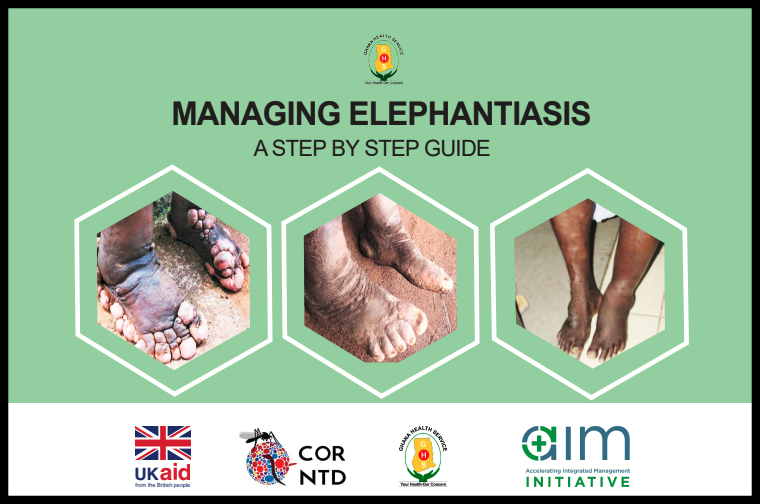Improving Access to Health Services in Ghana through Evidence-Based Health Worker Training
American Leprosy Missions’ AIM program has received an 18-month grant from the Coalition for Operational Research on Neglected Tropical Diseases (COR-NTD) to study and improve access to morbidity management and disability prevention services for people affected by lymphatic filariasis (LF) in two regions of Ghana. ALM implements this project through the Ghana Health Service as part of our approach to build governments’ capacity and ensure that marginalized populations have access to care.
LF is a debilitating neglected tropical disease (NTD) which leads to disfigurement and eventual disability, impacting the affected person’s ability to work or access services, as well as her or his social inclusion. Taken together, these factors negatively impact affected individuals and their families, both socially and economically. LF is endemic in Ghana, with the disease being present in 8 of its 10 regions.
In the first stage of the grant, American Leprosy Missions supported a study in Ghana’s Upper East and Upper West regions. The study collected responses from communities, health workers, and people affected by LF, yielding key insights about quality of life, access to care and morbidity management and disability prevention (MMDP) measures. The implementation of a LF morbidity management (MM) program in the Upper East region appears to positively affect those suffering from LF. For example, self-care practices, like daily washing of affected limbs with soap and water, were more prevalent in the Upper East (52%) region than the Upper West (18%). Other insights included:
- Health systems in endemic areas lack MM capacity;
- Most health workers lack MM training;
- Stigma, cost, mobility, and distrust of medical efficacy deter people suffering from LF from seeking health services, even when service is accessible.
To address these findings, ALM’s AIM program is exploring the effectiveness of training more than 60 community and district health workers and people affected by LF in the Upper West Region. The training encompasses disability prevention, self-care, and ways to care for others. Health workers in the project concentrate on MMDP measures against LF. Training health workers addresses the insights from the study by increasing capacity and training, and enabling increased interaction with people affected.
As part of this project, our recently created a series of information, education, and communication (IEC) materials illustrating instructions for self-care practices. Materials like these are critical tools for local health workers and people affected by LF.
This collaboration with COR-NTD will result in more effective training techniques for health workers, enabling Ghana’s health system to better identify and serve people with NTDs. American Leprosy Missions pursues projects like this to facilitate better access to quality health services for vulnerable and marginalized people, bringing local and global communities that much closer to achieving Universal Health Coverage.
About COR-NTD: American Leprosy Missions receives funding from the Coalition for Operational Research on Neglected Tropical Diseases (COR-NTD): a group of researchers, program implementers and their supporters who combat and seek to end neglected tropical diseases (NTDs). Specifically, COR-NTD aligns operational research initiatives with programmatic needs to better serve affected populations.

